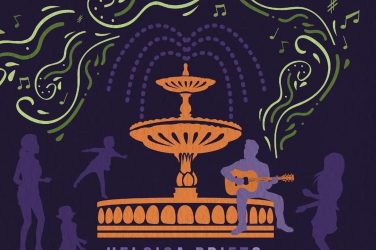
In her last studio album—Com Você… Meu Mundo
Estaria Completo
from ’99—Cássia Eller sang more softly
than in her previous works. At the time, she credited
her newfound vocal softness to a
request by her son,
who complained that she “screamed too much”.
As 2001 approached its conclusion, Brazilian music faced another untimely loss: On December 29, Cássia Eller, a
deep-voiced, no-nonsense singer passed away in Rio de Janeiro of undisclosed causes. She was 39. Ms. Eller was one of the
most versatile voices to appear in the Brazilian pop scene after the eighties rock boom.
Her first big hit was “Por Enquanto” (“Meanwhile”), a Renato Russo-penned song originally recorded by his band,
the now-defunct Legião Urbana. Her version, which hit the airwaves in the summer of 1990, featured Eller’s unique vocal
talents simply accompanied by her own acoustic guitar with a snippet of The Beatles’ “I’ve Got A Feeling”.
That first song made us notice how different Cássia Eller sounded. Instead of the bland, poppish female voices that
dominated the previous decade, music fans were introduced to a tough, no-frills contralto that came with a promise. Her first record,
simply titled Cássia Eller, had several jewels, such as a remake of Jimi Hendrix’s “If Six Was Nine” and a reggae-spiced remake
of The Beatles’ “Eleanor Rigby.”
Her second album, “O Marginal”, went quite unnoticed, but her rendition of
Hendrix’s “I Keep My Train A-Coming”
was something out of the ordinary. The third one, however, would ultimately turn Cássia Eller into a household name. Simply
titled Cássia Eller, the record was an indisputable success. Its biggest song, “Malandragem” (“Loafing”), penned by Cazuza
and Frejat, was an immediate hit, and Eller’s versatility was finally noticed nationwide.
The album contained classic samba songs, remakes of rock hits (including Otis Redding’s “Try a Little
Tenderness”), and some original material penned by composers such as Marisa Monte, Carlinhos Brown and Nando Reis. That album
was an unstoppable hit, which led to a sold-out national unplugged tour, in which she basically went through the songs on
her own guitar, accompanied by two other musicians. A CD of that tour was released in 1996.
Eller was considered by many the musical heiress of the late Cazuza (who died of AIDS eleven years ago) not only
by her musicality but also by her brashness: like that singer, she was openly gay (she lived in a stable same-sex relationship
for over ten years) and did not shun from controversy when onstage.
During shows, she would often grope herself or expose her breasts to the audience. Of course, Cazuza never did
anything like that, but he got a lot of flak from the press by appearing visibly drained from the effects of AIDS, to the point of
being on the verge of collapsing during shows as he ended what would turn out to be his final tour.
In 1997, she released Veneno
Antimonotonia (Anti-Boredom Poison), which was dedicated to the works of Cazuza.
Earlier that year, she had guested in a number of shows by the late composer’s former band, Barão
Vermelho.
I saw one of those presentations when the band appeared at Biruta, a famous stage in Fortaleza, Brazil. Halfway
through the band’s set, she entered the stage and brilliantly performed “Malandragem” and other songs. She ended her
participation by sharing the lead with Roberto Frejat (the band’s lead guitarist and vocalist) “Só as Mães São Felizes” (Only Mothers
Are Happy), a bluesy Cazuza/Frejat tune that had been included in the band’s most recent album then.
Her last studio album was 1999’s Com Você… Meu Mundo Estaria Completo
(With You, My World Would Be Complete), in which Eller sang more softly than in her previous works. At the time, she credited her newfound vocal softness to a
request by her infant son, who complained that his mother “screamed too much”.
Cássia Eller went through a long-term treatment to kick her cocaine habit. “I did it by my own will”, she told the press
a few months ago. She had recently released a new live album,
MTV Unplugged, which has been her biggest-selling
record. She was getting ready for a national tour and for a New Year’s musical bash in Rio de Janeiro.
On the morning of Dec 29, she entered the Santa Maria Clinic in Rio de Janeiro with stress-related symptoms. That
afternoon, she was admitted to intensive care and died early in the evening after three cardiac arrests. The Brazilian
press immediately assumed that Cássia Eller had had a drug overdose, but her family firmly denied that.
The results of her autopsy, as of this writing, have not yet been released. She is survived by her only son,
Francisco, better known as Chicão, who is currently eight years old. The most lasting memory I have of Cássia Eller was when I
attended her show at Pirata, a famous Club in Fortaleza, during her first national tour in 1991, in which I was, for the first time,
exposed
to her music and irreverence.
After the gig, I ventured to chat (those were the days…) with the musicians of her band (especially her bass player,
the late Otavio Fialho, who would later father Eller’s only child). I stuck around at the club with a couple of acquaintances ,
and one of them (let’s call him “Bruce”) was with a date. As Eller walked towards the bus, she shook hands with us and then,
as the girl approached her, Eller held her hand, looked at her and simply led her away to the band’s bus, which would take
them to a nearby hotel.
At that time, Eller had not yet “come out” publicly, so we sort of looked at each other and at “Bruce”, who, like us,
could not understand what was going on. Whatever happened after that I never found out, for “Bruce” never told me.
For more on Cássia Eller, log on to
http://www.cassiaeller.com.br
Ernest Barteldes is an ESL and Portuguese teacher. In addition to that, he is a freelance writer who has been
weekly contributing to the Greenwich Village Gazette
since September 1999. His work has also been published by
The Staten Island Advance, The Staten Island
Register, The SI Muse, The
Villager, Brazzil magazine, GLSSite
and other publications. He lives on Staten Island, NY. He can be reached at
ebarteldes@nycny.net
|
Gatas Extraordinárias Caetano Veloso O amor me pegou |
Extraordinary Pussycats
Love caught me Caetano Veloso composed this song |
Send
your
comments to
Brazzil









